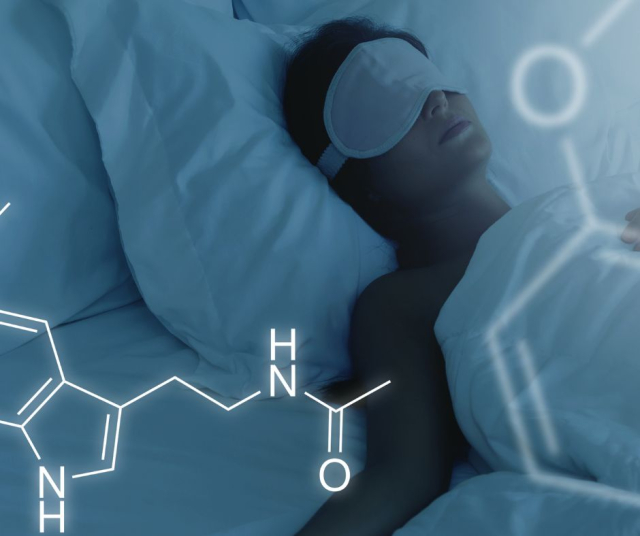Melatonin is a fascinating hormone that plays a critical role in the human body's sleep-wake cycle. But its influence is not limited only to sleep; It also has effects on a variety of biological functions and has become a focus of research in areas ranging from mental health to aging.
What is melatonin?
Melatonin is a hormone produced primarily by the pineal gland in the brain, although it is also found in other parts of the body, such as the gastrointestinal tract. Its synthesis and release are closely linked to the light and dark cycle, being higher during the night and lower during the day. This relationship with the circadian cycle makes it a vital component to regulate the sleep-wake rhythm of the human body. Melatonin not only acts as a sleep inducer, but also plays important roles in immune system regulation, antioxidant protection, and possibly the aging process. Its role as an antioxidant implies the ability to protect cells from damage caused by free radicals, while its influence on the immune system suggests a role in strengthening the body's natural defenses against disease and infection. Additionally, it has been noted that melatonin may have beneficial effects on cardiovascular health by helping to reduce blood pressure and cholesterol.
Role of melatonin in sleep
The best-known role of melatonin is to regulate the sleep-wake cycle. It is considered a sleep-inducing hormone, meaning that its increase in the blood signals to the body that it is time to sleep. Melatonin helps regulate the body's internal clock, which in turn controls when we feel sleepy and when we are alert.
During the day, the pineal gland produces little melatonin due to exposure to sunlight. However, when light decreases at night, melatonin production increases, helping us feel tired and ready to sleep. This increase in melatonin persists through the night and decreases again in the morning, when sunlight is again present.
Sleep regulation and sleep disorders
Given its role in sleep regulation, melatonin has been used in the treatment of several sleep disorders, such as insomnia and jet lag. People who have difficulty falling or staying asleep may benefit from melatonin supplements to help regulate their sleep cycle.
Additionally, melatonin may also be helpful for people who work night shifts or have irregular schedules, as it can help adjust their biological clock so they can sleep during the day and be alert at night.
Other benefits of melatonin
In addition to its role in sleep, melatonin has also been linked to a number of other health benefits:
Antioxidant:
Melatonin is a powerful antioxidant that can help protect the body's cells from damage caused by free radicals. This can have benefits for overall health and help reduce the risk of chronic diseases such as heart disease and cancer.
Immune system:
Melatonin has been shown to modulate immune system function, meaning it can help strengthen our natural defenses against illness and infection.
Aging:
Some research suggests that melatonin may have anti-aging effects by helping to protect the body from oxidative stress and other processes associated with aging.
Mental health:
There is evidence to suggest that melatonin may play a role in mood regulation and may be useful in the treatment of mood disorders such as depression and anxiety.
Melatonin and cardiovascular health
In addition to its antioxidant effects, melatonin may also have benefits for cardiovascular health. Some studies have suggested that melatonin may help lower blood pressure and cholesterol, which in turn may reduce the risk of heart disease and stroke.
Sources of melatonin
While melatonin is produced naturally by the body, it is also found in some foods. The best dietary sources of melatonin include fruits such as cherries, bananas, and pineapples, as well as vegetables such as corn, tomatoes, and peppers. However, the amount of melatonin found in these foods is relatively small compared to supplements.}
Melatonin supplements are widely available in the form of pills, tablets, or liquid drops. These supplements may be helpful for those who have difficulty falling or staying asleep, or for those who want to take advantage of the potential health benefits of melatonin.
Safety Considerations and Side Effects
In general, melatonin is considered safe for most people when used short-term at recommended doses. However, as with any supplement, there may be risks associated with its use, especially when taken in doses that are too high or for a long period of time.
Some possible side effects of melatonin include daytime sleepiness, dizziness, headaches, and stomach problems. Additionally, melatonin can interact with certain medications, such as blood thinners, blood pressure medications, and antidepressants, so it's important to talk to a doctor before you start taking it, especially if you are taking other medications.
Melatonin is a multifaceted hormone that plays a critical role in regulating sleep and has a number of other potential health benefits. From helping you sleep to protecting against chronic diseases and strengthening the immune system, melatonin continues to be the subject of research in a variety of areas.
While melatonin supplements may be helpful for some people, it is important to note that they are not a miracle solution and may not be suitable for everyone. As with any supplement, it is important to speak with a doctor before starting taking melatonin to make sure it is safe and appropriate for you.
